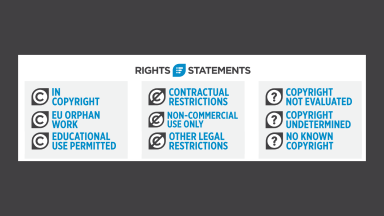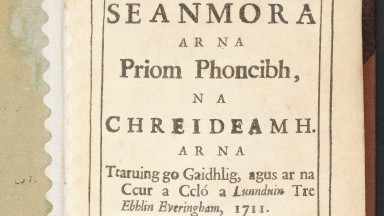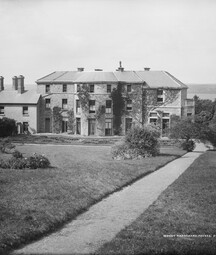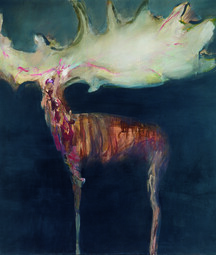These statements play a vital role in helping cultural heritage institutions clearly communicate how digital content can be used.
We would like to extend special thanks to Lauren Ní Fhloinn and Dr. Johanna Archbold for their valuable time and expertise as independent reviewers of the translation.
In keeping with their translation policy, RightsStatements.org is now inviting feedback from the public. The review period is currently open, and interested individuals or organisations are encouraged to review the draft translations and share their comments.
Have your say: whether you're an educator, researcher, or someone interested in Irish culture, your feedback is important. The translation review is open until July 4, 2025.
What are the RightsStatements.org and Why are they Important?
Led by Europeana and the Digital Public Library of America, RightsStatements.org is an international collaboration that provides a clear, standardised way for cultural heritage institutions to communicate the copyright and re-use status of digital materials. These statements provide a best practice for use by both international, national and regional aggregators of cultural heritage data, and the individual institutions and organisations that contribute data to them.
How Does the NLI Use RightsStatements.org?
Providing access is a key part of the NLI’s mission to collect, protect and make available the recorded memory of Ireland. As stated in our Digital Preservation Policy, we view continued access to and re-use of our collections as the primary driver for our investment in digital preservation and for all the other steps involved in acquiring, describing and caring for the collections in our care. However, in facilitating access, a core concern of the NLI is to respect the copyright and related rights of rights holders as well as the wishes of collection donors.
The specific constraints in terms of how the NLI can make material available online can in some cases be quite complex. This in turn makes it difficult for NLI Readers’, researchers, and members of the public to know how and if they can re-use material they encounter on the NLI catalogue.
A Bilingual Approach to Access
We're especially pleased to see these statements now available in the Irish language. Here's an example of how they are displayed:
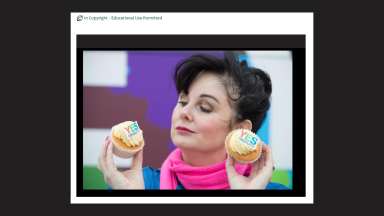
An image of Marian Keyes, taken by Paul Sharp as part of the Yes Equality Campaign Archive (YE/848800/023/001)
Above the image of Marian Keyes, a RightsStatements.org notice clearly indicates re-use status, and clicking on it provides users with a detailed explanation, available in both English and Irish.
Along with the well-known Creative Commons licences which can be applied directly by rights holders themselves, RightsStatements.org allow the NLI and other cultural heritage organisations to consistently communicate the copyright status of material to its users. Similarly, the NLI has also found that RightsStatements.org provides an excellent framework for discussions with rights holders and donors in order to ensure clarity between parties at the point of acquisition.
Share Your Feedback
We’re delighted to see these statements in the Irish language. Once published, the translations will be incorporated into our online catalogue, and we hope that users find them helpful and that other Irish cultural heritage institutions find them useful too.
Visit RightsStatements.org and submit your feedback by July 4, 2025.
Together, we can help make cultural heritage more accessible, clearly, fairly, and bilingually.
